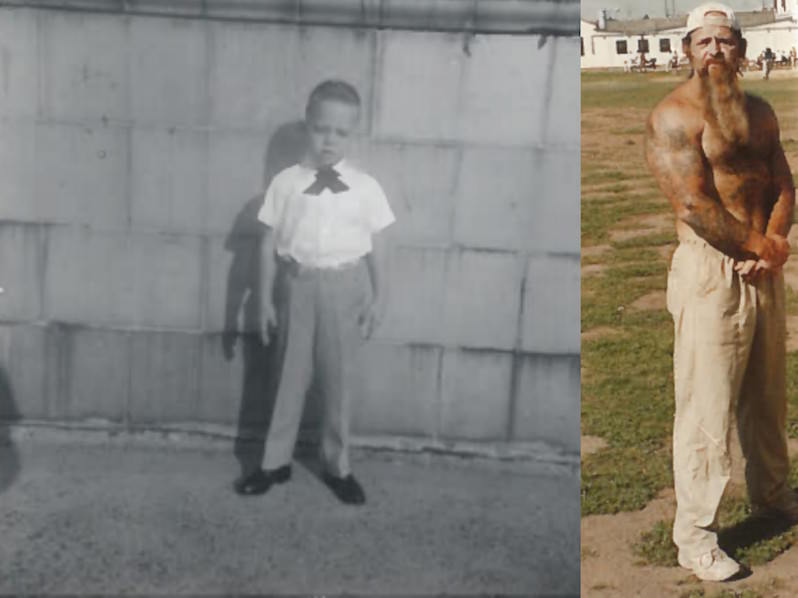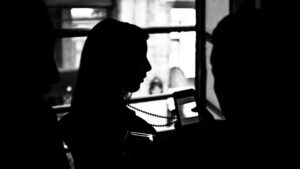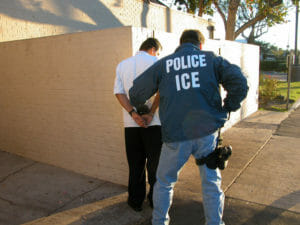Part 1: Innocence Lost—From Abused Child to Convicted Murderer
The author was recently released from prison after spending 30 years behind bars. In this seven-part series exclusive to Truthdig, he recounts his experience, starting with his early years. Ronald W. Pierce with his parents in the early 1980s, before he went to prison. (Ronald W. Pierce)
Ronald W. Pierce with his parents in the early 1980s, before he went to prison. (Ronald W. Pierce)
By Ronald W. PierceEditor’s note: This story is the first part of a seven-part series exclusive to Truthdig called “Going Home.” Read Part 2, Part 3, Part 4, Part 5, Part 6 and Part 7.
My parents were involved with the local Little League baseball team in Bayonne, N.J. My mother created and operated the concession stand at the field. My father helped build the stadium. They were friends with a man I will call Charles, who was associated with my Little League team. My parents naively trusted Charles to be alone with their children. This was a mistake.
[Editor’s note: Charles is a pseudonym.]
My first experience with Charles was when he casually pulled me onto his lap. “Can you keep a secret?” he whispered. He then guided my hand to his genitals. I tried to pull my hand away. He held my arm. He whispered, “It’s all right. Squeeze it. Just keep it a secret between you and me.” This moment has repeated itself in my head for more than 50 years.
The touching became more aggressive once my parents allowed him to drive me to practice. For the next 4 1/2 years, he sexually abused me.
Charles told me that if I mentioned anything to my father, my father would believe him over me. I feared my father, a stern man who practiced corporal punishment. I said nothing.
I was 11 when I came home with the crotch of my jeans ripped after a trip with Charles. My mother asked what had happened. I did not tell her. She forbade me from ever going anywhere with Charles again. I went to my room and sobbed in relief.
The sexual abuse caused me to question my masculinity for decades. It was like a secret disease eating away at my dignity. I questioned the motives of anyone who tried to get close to me. I saw, lurking in the shadows of everyone, a dark and hidden agenda. I did not let my guard down. I treated everyone with suspicion.
I took up boxing as teenager. No one would hurt me again. I got into frequent fights. I joined a gang and became its leader. Unbeknown to my family, I learned to ride a friend’s Honda 250 on Hook Road at the age of 12. The back trails were isolated from traffic, heavily industrial, filled with oil tanks and stray goats.
Most people feared the members of the local motorcycle club. I wanted this; I confused it with respect. I began wearing black T-shirts, jeans and a leather vest and jacket. I bought a dirt bike. I made these purchases with money I got from dealing drugs at age 14. I would go to New York City, purchase Tuinals or Quaaludes and share the profit with local drug dealers. I never took drugs, however. I was an A student in high school.
But rage and hatred festered inside me. People walked on eggshells around me. I have an eye condition that prevents one of my eyelids from closing. My eye would redden when I got angry. A red eye signaled I was on the verge of exploding. No one understood this rage except Eddie, who had also experienced Charles’ abuse. This topic, even today, is taboo between us.
I met Karen, now my fiancée, when I was 16. We went down to the shore by Seaside Heights. The date was awkward and quiet. I really liked her. She was gentle, beautiful and bright. I knew I needed her. Nevertheless, I felt strongly that I was not worthy of her. I did not call her after our first date.
I played football as a center in high school. I was a little over 6 feet tall and a good athlete. Football was an outlet for my rage. I rammed into other players like a truck. A couple of colleges were interested. But I joined the Marines in 1976, on the delayed entry program so I could finish high school first. I was sent to Marine Corps boot camp in Parris Island, S.C.
I attended the Advanced Infantry Training School in Camp Lejeune, N.C., after I completed boot camp. I was stationed with Company A, Battalion Landing Team (1/2) as a rifleman. I often got in trouble in the Marines. I had difficulty taking orders. I did not respect authority. I was offered an honorable discharge a little after a year. I took it.
I worked hard at unfulfilling jobs when I returned to New Jersey. I thought about enrolling in college. I inquired at Saint Peter’s University in Jersey City. Administrators said I could get in if I attended junior college first, but I didn’t go. Instead, I founded a motorcycle club with some people I knew from high school. There was heavy drinking. The members of the club venerated violence, which I exuded. The club became the center of my life.
I met Jane when I was in the club. I thought I had found a woman I could love and with whom I could spend the rest of my life. Still, I could not tell her about my childhood abuse. I could not tell her my emotions. I lived in an emotional cage.
Jane became pregnant. A spark lit my heart. We got engaged. But I could never be emotionally honest with Jane, and the trust between us waned. I could not make a commitment. She confronted me about my coldness. I became defensive and evasive. She broke off the engagement and got an abortion. My heart became even harder. Once more, my haunted past had tainted my present.
The loss of Jane and my unborn child sent me spiraling out of my control. I would fight anyone for trivial reasons.
I took off to my aunt’s house in central Florida. I tried to gain control over my rage. I lived there for a year and a half. Then I learned that my father had suffered a massive heart attack. I flew back to New Jersey that night. I was not sure my father wanted to see me. I had not spoken to my parents in more than a year. I blamed them for my troubled life.
I walked into the intensive care unit. My father was hooked to a heart monitor. The machine beeped madly when I entered the room.
“I’m sorry,” I said. “I’ll leave.”
He said, “I’m glad to see you.”
I cried for the first time since I was a small boy.
It was close to Thanksgiving. I decided to stay in New Jersey. My father would slowly recover. I fell back into old habits within 10 days. I returned to the motorcycle club. I became its enforcer. I was 6-foot-1 and weighed 210 pounds. I could bench press 365 pounds four or five times in a row. Trained as a boxer and a Marine, I was a formidable force. I was numb. My emotions were dead. I lived only for my motorcycle and the club.
I got into the carpenters union. I started to get my outward life in order. But my inner turmoil only escalated.
On March 1, 1986, we had a birthday celebration for my mother. Later that evening I left the party to join Mike, my best friend. We celebrated the birth of his son. On our way home, Mike and I stopped in to see a friend of mine at a bar. An altercation took place between a man and a couple of teenage girls, who had come from a teen party in the back of the bar. I intervened. The man backed down. Mike and I left the bar. I laid down in the back seat of Mike’s car. It had been a night of heavy drinking. I was awakened by the shaking of the car. There was a struggle in the front seat. I saw the man from the bar fighting with Mike. I exploded. I leapt for the man with my knife and slit his throat. Only after he was dead did I realize what I had done. I became sick.
I was arrested the next day and later found guilty of murder. I was sentenced to 30 years to life, plus seven years. Two weeks after I was sentenced, I was transferred out of the county jail to Trenton State Prison.
Part 2 of the “Going Home” series will be published on Truthdig on Thursday.
Ronald W. Pierce served 30 years, eight months and 14 days in New Jersey prisons for murder. Released in 2016, Pierce now is living in Jackson, N.J., and completing his Bachelor of Arts study at Rutgers University. He is an honors student, majoring in justice studies with a minor in sociology.
Your support matters…Independent journalism is under threat and overshadowed by heavily funded mainstream media.
You can help level the playing field. Become a member.
Your tax-deductible contribution keeps us digging beneath the headlines to give you thought-provoking, investigative reporting and analysis that unearths what's really happening- without compromise.
Give today to support our courageous, independent journalists.



You need to be a supporter to comment.
There are currently no responses to this article.
Be the first to respond.